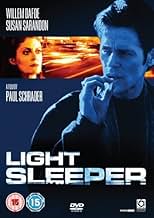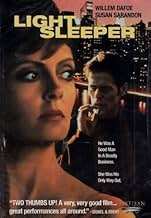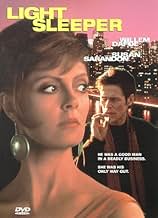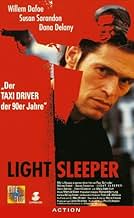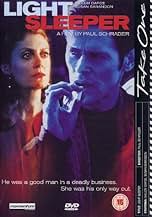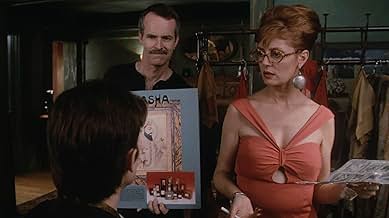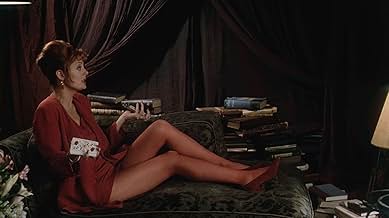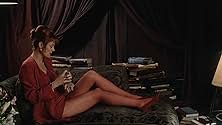AVALIAÇÃO DA IMDb
6,9/10
11 mil
SUA AVALIAÇÃO
Um traficante reconsidera sua profissão quando seu chefe planeja seguir às leis e uma velha paixão reaparece.Um traficante reconsidera sua profissão quando seu chefe planeja seguir às leis e uma velha paixão reaparece.Um traficante reconsidera sua profissão quando seu chefe planeja seguir às leis e uma velha paixão reaparece.
- Prêmios
- 1 vitória e 6 indicações no total
Rene Raymond Rivera
- Manuel
- (as a different name)
Vince Cupone
- Young Cuban
- (as Vinny Capone)
Chris Northup
- Retro Yuppie
- (as Christopher Todd Northup)
Avaliações em destaque
Drifting through life - I guess ome can really understand what that's like. The status quo is something you don't approve of, but you don't have the willpower to break through and change yourself or rather the way you live. It probably one of the few cases to depict this quite exceptional, without really pointing it out. In a way this is quite amazingly done.
And then there is the case! Yes Susan Sarandon and yes Willem Dafoe - but what Sam Rockwell in a small scene too? And even David Spade in a role that will not annoy many (though also not make many laugh as he is able to do). The story itself is pretty straightforward but it is the layers that really should get to you - that is if you are looking for them. Maybe you'll just enjoy a thriller, which also is not a bad thing at all. Human depths and flaws be damned
And then there is the case! Yes Susan Sarandon and yes Willem Dafoe - but what Sam Rockwell in a small scene too? And even David Spade in a role that will not annoy many (though also not make many laugh as he is able to do). The story itself is pretty straightforward but it is the layers that really should get to you - that is if you are looking for them. Maybe you'll just enjoy a thriller, which also is not a bad thing at all. Human depths and flaws be damned
This is a pretty good movie about a drug dealer with a conscience. I enjoyed the look and feel of the film, but felt that the script and story-line struggled at points. In one instance, Dafoe's character relates "White drugs for white people". Also, Dana Delaney puts in a good performance but definitely second to Dafoe's - her performance is not quite complete, and I was left feeling as though the film just had that extra something missing.
This is a brilliant film. The raw, humane, unvarnished look at the life of a mid level drug dealer in Manhattan is uniquely captivating, and Willem Defoe plays the part to perfection. The story itself is underwhelming, common, real. The protagonist's struggles through life are much like anyone else's. Anyone else's in New York, at least. But the context of his life, the rhythms of it, are very different. The random encounters with love and violence touch him as arbitrarily as they touch each of us, and he reacts to them with the same confusion, elation, and pain. This is the film's genius, and it allows an unusually close emotional bond to develop between the protagonist and the audience.
Overall rating: 8 out of 10.
This is a brilliant film. The raw, humane, unvarnished look at the life of a mid level drug dealer in Manhattan is uniquely captivating, and Willem Defoe plays the part to perfection. The story itself is underwhelming, common, real. The protagonist's struggles through life are much like anyone else's. Anyone else's in New York, at least. But the context of his life, the rhythms of it, are very different. The random encounters with love and violence touch him as arbitrarily as they touch each of us, and he reacts to them with the same confusion, elation, and pain. This is the film's genius, and it allows an unusually close emotional bond to develop between the protagonist and the audience.
Overall rating: 8 out of 10.
Paul Schrader's love/hate relationship with close to down-and-out male individuals living in New York City continues in 1992's Light Sleeper. Schrader casts a dim eye on most of the proceedings in the place, but his revisiting of New York City in Light Sleeper, and whatever knowledge past you have of 1976's Taxi Driver, shows a clear fondness for the place; a fondness to keep going back and exploring new characters, operating under new situations and working with new problems floating around inside of their heads. In Light Sleeper's case, it is Willem Dafoe's John LeTour, a middle aged man whom deals drugs; meets some pretty desperate individuals in the process; cannot connect that well with the women he wants most; is stalked by police men and generally tries to balance his on-going loneliness with his inability to really find his place in life.
Light Sleeper is a wonderfully down to Earth and thoroughly intense film. With hindsight, one might think of it as a Trainspotting without all the hyper-kinetic energy. The film begins, quite literally, with a focusing on a road as we flow through New York; this is before developing into a ground level documentation of life flitting between streets, apartments that inhabit drug users and dealers, grotty nightclubs that house further users plus hotel suites which spell danger. The easy way to summarise the male lead we're given in Light Sleeper would be a comparison to Taxi Driver's Travis Bickle, as penned by Schrader. LeTour is a loner; he keeps a diary, although possesses better handwriting skills; attempts to talk and follow women he simply cannot have; and generally wanders. There is even room for the characters to pay reference to the rain at certain times, and its importance. Like Taxi Driver; the film is a gathering, only not of an individual's visions of what's around him, but of the interactions and of the people that exist around him.
This idea is best explored in a scene set in a hospital. LeTour is visiting the mother of a certain Marianne Jost (Delany), as another relative, whilst in the intensive care room, sits asleep in a chair. LeTour walks in and sits down. The camera freezes on him sitting there, almost certain death in the air by way of the dying mother and the fact there are those he hands drugs out to whom will perish at some point in the near future. It's only after a while that he glances over at the relative, and it's only then that the camera will slowly track left to encompass, indeed recognise, she's even sitting there. It's an interesting touch by Schrader, and reminiscent of Taxi Driver by being a sort of polar opposite: we see, indeed recognise, what LeTour sees but only until HE does so first. We do not get it in that raw, unflinching and 1st person style the 1976 masterpiece delivers, but we do get it in some manner of speaking.
Light Sleeper knows what it is and knows exactly how it wants to unfold. The film isn't a conventional thriller, of sorts, about a drug dealer and a world of crime and the interactions that go on, even if it does end in a conventional manner by way of a bloody shootout. Rather, the film is a stark character study of a man on the way out; of a man wasting his life away through drugs, not as a junkie – something LeTour stresses to certain people he meets, but as a dealer and that any relation you might have to the stuff will most probably end you up in very bad shape. As a raw character study, we pick the lead up in his late thirties and cover him for about a fortnight. The damage has been done; we learn of his past troubles and whatever back-story we require by way of speech to other people, and we learn it all at regular, very well spaced intervals.
The film's attention to LeTour's element of unrequited love in his life is additionally well handled, somewhat seamlessly incorporated into the text by way of a series of nervous and unfortunate encounters. We first meet the aforementioned Marianne when LeTour's chauffeur driven saloon stops to pick her up out of the wet. By way of Dafoe's wonderful acting, LeTour is juddery and the professionalism driven image that we have of him up to this point, by way of short sharp encounters and knowing exactly what to say to different sorts of lowlifes, is shattered somewhat when he lies to her about continuing dealing drugs and screws up the whole interaction. The lyrics in the music and the manner in which the character regresses over a photo-album in the following scene could have been explored and executed in a far worse-a manner. The film's remaining scenes of obsession and rejection surrounding these two are well incorporated into the text.
I think Light Sleeper's crowning glory is its real attention to the finer things. There's a scene in which LeTour's consistently outrageously dressed female drug contact Ann, (Susan Sarandon, fresh off a wonderful role in Thelma and Louise) who is the the person that supplies all of the drugs to LeTour along with Robert (Clennon), from their pseudo-upper class decorated apartment, asks LeTour for a lunch meeting the following day. I got an odd sensation after the interaction had ended that a lesser film would cut straight to the lunch: person 'A' proposes something to person 'B'; person 'B' accepts and then we cut to the rendez-vous. Light Sleeper rejects the causality, opting for notions, interactions and ideas to rest on the back-burner whilst the lead carries on for a while interacting further with other people before the day is out. Make no mistake, there'll be no light napping during this picture.
Light Sleeper is a wonderfully down to Earth and thoroughly intense film. With hindsight, one might think of it as a Trainspotting without all the hyper-kinetic energy. The film begins, quite literally, with a focusing on a road as we flow through New York; this is before developing into a ground level documentation of life flitting between streets, apartments that inhabit drug users and dealers, grotty nightclubs that house further users plus hotel suites which spell danger. The easy way to summarise the male lead we're given in Light Sleeper would be a comparison to Taxi Driver's Travis Bickle, as penned by Schrader. LeTour is a loner; he keeps a diary, although possesses better handwriting skills; attempts to talk and follow women he simply cannot have; and generally wanders. There is even room for the characters to pay reference to the rain at certain times, and its importance. Like Taxi Driver; the film is a gathering, only not of an individual's visions of what's around him, but of the interactions and of the people that exist around him.
This idea is best explored in a scene set in a hospital. LeTour is visiting the mother of a certain Marianne Jost (Delany), as another relative, whilst in the intensive care room, sits asleep in a chair. LeTour walks in and sits down. The camera freezes on him sitting there, almost certain death in the air by way of the dying mother and the fact there are those he hands drugs out to whom will perish at some point in the near future. It's only after a while that he glances over at the relative, and it's only then that the camera will slowly track left to encompass, indeed recognise, she's even sitting there. It's an interesting touch by Schrader, and reminiscent of Taxi Driver by being a sort of polar opposite: we see, indeed recognise, what LeTour sees but only until HE does so first. We do not get it in that raw, unflinching and 1st person style the 1976 masterpiece delivers, but we do get it in some manner of speaking.
Light Sleeper knows what it is and knows exactly how it wants to unfold. The film isn't a conventional thriller, of sorts, about a drug dealer and a world of crime and the interactions that go on, even if it does end in a conventional manner by way of a bloody shootout. Rather, the film is a stark character study of a man on the way out; of a man wasting his life away through drugs, not as a junkie – something LeTour stresses to certain people he meets, but as a dealer and that any relation you might have to the stuff will most probably end you up in very bad shape. As a raw character study, we pick the lead up in his late thirties and cover him for about a fortnight. The damage has been done; we learn of his past troubles and whatever back-story we require by way of speech to other people, and we learn it all at regular, very well spaced intervals.
The film's attention to LeTour's element of unrequited love in his life is additionally well handled, somewhat seamlessly incorporated into the text by way of a series of nervous and unfortunate encounters. We first meet the aforementioned Marianne when LeTour's chauffeur driven saloon stops to pick her up out of the wet. By way of Dafoe's wonderful acting, LeTour is juddery and the professionalism driven image that we have of him up to this point, by way of short sharp encounters and knowing exactly what to say to different sorts of lowlifes, is shattered somewhat when he lies to her about continuing dealing drugs and screws up the whole interaction. The lyrics in the music and the manner in which the character regresses over a photo-album in the following scene could have been explored and executed in a far worse-a manner. The film's remaining scenes of obsession and rejection surrounding these two are well incorporated into the text.
I think Light Sleeper's crowning glory is its real attention to the finer things. There's a scene in which LeTour's consistently outrageously dressed female drug contact Ann, (Susan Sarandon, fresh off a wonderful role in Thelma and Louise) who is the the person that supplies all of the drugs to LeTour along with Robert (Clennon), from their pseudo-upper class decorated apartment, asks LeTour for a lunch meeting the following day. I got an odd sensation after the interaction had ended that a lesser film would cut straight to the lunch: person 'A' proposes something to person 'B'; person 'B' accepts and then we cut to the rendez-vous. Light Sleeper rejects the causality, opting for notions, interactions and ideas to rest on the back-burner whilst the lead carries on for a while interacting further with other people before the day is out. Make no mistake, there'll be no light napping during this picture.
Paul Schrader is a director whose films should be seen more often. He is a man that never compromises and tackles adult themes with great panache, as he has amply demonstrated throughout his distinguished career. He was long associated with Martin Scorsese, but when he decided to go on his own, he showed his talent was there all the time.
Mr. Schrader's films have a sense of style that are not easily matched by many of today's filmmakers. He knows what seems to work, and what not. His movies show a sophistication, as we mere mortals, are invited to participate, even though we haven't received the invitation in the mail.
Most comments in this forum are excellent, so we won't even attempt to add anything that hasn't been said before. "Light Sleeper" is supposed to be one of Mr. Schrader's favorite films, and it's clear to see why. He has infused the film with characters that are easy to see why they are portrayed on the screen. Willem Dafoe is obviously an actor held in high esteem by Mr. Schrader. As John LaTour, Mr. Dafoe is at his most introspective self. His character shows a complexity that is hard to match.
The rest of the cast is excellent. Susan Sarandon is perfect as Ann. Dana Delaney is Marianne. Mary Beth Hurt, Victor Garber, Sam Rockwell, David Spade, are seen in supporting roles.
The great atmospheric music of Michael Been is heard in the background and it helps add another layer in the texture of the finished product. Edward Lachman does an amazing job with the way he photographed the film that includes a lot of night time scenes in Manhattan.
Take a look at the film, as Mr. Schrader will impress, even a casual viewer.
Mr. Schrader's films have a sense of style that are not easily matched by many of today's filmmakers. He knows what seems to work, and what not. His movies show a sophistication, as we mere mortals, are invited to participate, even though we haven't received the invitation in the mail.
Most comments in this forum are excellent, so we won't even attempt to add anything that hasn't been said before. "Light Sleeper" is supposed to be one of Mr. Schrader's favorite films, and it's clear to see why. He has infused the film with characters that are easy to see why they are portrayed on the screen. Willem Dafoe is obviously an actor held in high esteem by Mr. Schrader. As John LaTour, Mr. Dafoe is at his most introspective self. His character shows a complexity that is hard to match.
The rest of the cast is excellent. Susan Sarandon is perfect as Ann. Dana Delaney is Marianne. Mary Beth Hurt, Victor Garber, Sam Rockwell, David Spade, are seen in supporting roles.
The great atmospheric music of Michael Been is heard in the background and it helps add another layer in the texture of the finished product. Edward Lachman does an amazing job with the way he photographed the film that includes a lot of night time scenes in Manhattan.
Take a look at the film, as Mr. Schrader will impress, even a casual viewer.
Paul Schrader's finest film to date, and firmly lodged in my top 10, this is a surprisingly overlooked and underrated gem. Often touted as a "modern noir" movie, I really don't consider it in that genre at all.
The heart of the film is a reworking of the themes embodied in Schrader's earlier film "American Gigolo", where a man is forced to confront the fact that the life he is leading is fundamentally unsatisfying, reassess what he wants to do, find out who his real friends are and ultimately get redeemed through love.
Willem Dafoe's character Le Tour's journey is a slow but inevitable one, as his drug-dealing days are numbered due to his boss Susan Sarandon (also splendid) "going straight". Most of the scenes take place at night (hence the noir tag), but this is partly a consequence of the drug-dealing aspect and partly to capture the unreal mood of a man who doesn't know where he fits in to "normal" life. The device whereby Le Tour spends many hours writing his thoughts in an exercise book, throwing it away when he fills it, then starting another one, is so strong and startling that I put aside my usual dislike of narration. The soundtrack is also excellent and fits and expands the mood very well.
The best scene is probably the one in the hospital cafeteria, where Le Tour has a conversation with his ex-girlfriend that he hasn't seen for a long time - immaculately acted, tremendously understated with so many things going unsaid... The final scene, although Schrader nicked it from a French film, and used it before in "Gigolo", is still very powerful, based on the idea that whether a man is in prison or not is completely unrelated to whether he is free.
The heart of the film is a reworking of the themes embodied in Schrader's earlier film "American Gigolo", where a man is forced to confront the fact that the life he is leading is fundamentally unsatisfying, reassess what he wants to do, find out who his real friends are and ultimately get redeemed through love.
Willem Dafoe's character Le Tour's journey is a slow but inevitable one, as his drug-dealing days are numbered due to his boss Susan Sarandon (also splendid) "going straight". Most of the scenes take place at night (hence the noir tag), but this is partly a consequence of the drug-dealing aspect and partly to capture the unreal mood of a man who doesn't know where he fits in to "normal" life. The device whereby Le Tour spends many hours writing his thoughts in an exercise book, throwing it away when he fills it, then starting another one, is so strong and startling that I put aside my usual dislike of narration. The soundtrack is also excellent and fits and expands the mood very well.
The best scene is probably the one in the hospital cafeteria, where Le Tour has a conversation with his ex-girlfriend that he hasn't seen for a long time - immaculately acted, tremendously understated with so many things going unsaid... The final scene, although Schrader nicked it from a French film, and used it before in "Gigolo", is still very powerful, based on the idea that whether a man is in prison or not is completely unrelated to whether he is free.
Você sabia?
- CuriosidadesWriter/director Paul Schrader experienced a unique problem while filming was underway in New York City. The film is set during a sanitation worker strike which called for large amounts of uncollected trash to be prominently featured in exterior scenes. But since the real New York City sanitation department was very much on the job they would inadvertently collect trash that was meant to be a part of the film's production design.
- Erros de gravaçãoWhen Marianne gets into the car at John LeTour's request, the car window is rolled down halfway. Once the door is closed, the inside angle shows the window closed. Water droplets can be seen on door's glass in the upper right corner of the movie frame.
- Trilhas sonoras24-7-365
(Agami / Belmaati / Christiansen / Moller)
© 1991 Megasong Publishing, Denmark
Performed by Wizdom-N-Motion
Courtesy of Mega Records, Denmark © 1991
Principais escolhas
Faça login para avaliar e ver a lista de recomendações personalizadas
- How long is Light Sleeper?Fornecido pela Alexa
Detalhes
- Data de lançamento
- País de origem
- Idiomas
- Também conhecido como
- Light Sleeper
- Locações de filme
- Empresas de produção
- Consulte mais créditos da empresa na IMDbPro
Bilheteria
- Orçamento
- US$ 5.000.000 (estimativa)
- Faturamento bruto nos EUA e Canadá
- US$ 1.050.861
- Fim de semana de estreia nos EUA e Canadá
- US$ 46.302
- 23 de ago. de 1992
- Faturamento bruto mundial
- US$ 1.055.987
Contribua para esta página
Sugerir uma alteração ou adicionar conteúdo ausente



